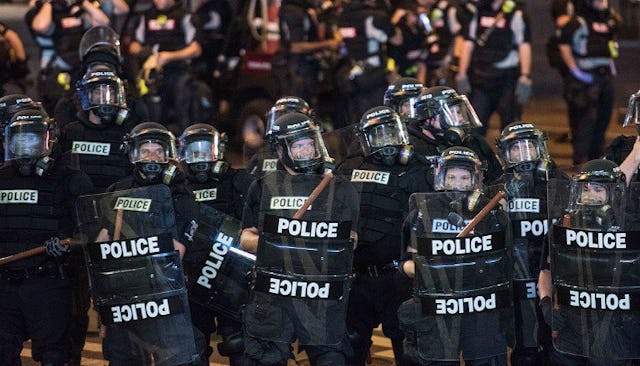4 Things To Consider When Talking To Our Kids About Police Brutality

“Kids” and “police brutality” are words I never thought I’d have to use in the same sentence. But the reality is that Americans are having to face this every day, especially if you happen to be raising three black boys in the inner city (raise your hand if you’re in that group; I know I am).
Just last month my son had a totally and completely positive interaction with the police. He was at a local outdoor shopping mall with his cousins, and the police stopped them as a reminder about the curfew at the shopping mall. My son was attending our family reunion, and we were staying at a nearby hotel. The officer told the boys to return to their hotel and be safe, and that was it. So, how do I tell my son that all police officers won’t be that nice?
How do we tell our kids that as they get older they may be perceived as a threat? How do I tell my son that even the pretty brown-skinned girl in his class might be slammed to the ground in her bathing suit by an adult who is supposed to protect her? How do I tell him that throughout history the police officers, whom he idolized as a little boy, have brutalized men who look like his dad, grandfather, and uncles?
It’s tough, and I don’t have all the answers, but here are some talking points to include in your conversations about kids and police brutality.
1. All cops aren’t bad cops.
In light of all the shootings that have occurred, we can’t forget about the police who are just like the one my son met last month. He just wants to get home safe and keep peace in the community. As a mom of three black boys, it’s hard for me to admit it, but all cops aren’t bad.
2. Racism IS real!
You can’t talk to your kids about police brutality without mentioning that some people simply do not like others because of the color of their skin. We would be leaving out a huge factor in the issues that cause police brutality if we didn’t mention the fact that most police brutality victims are targeted because of race.
3. It happens to girls too!
Let’s talk about Sandra Bland, the young black girl in South Carolina who was pulled from her desk and tossed across the room by a police officer, and we can never forget the young girl from Texas who was pinned down by a police officer while wearing her bikini. Our conversations about police brutality must include our young black girls. Sometimes we are so consumed with having the conversation with our sons who might be pulled over by police that we forget it’s happening to our girls too. Our sons need to realize that not only should they be protecting themselves from renegade officers, but that they also must look out for their sisters too.
4. It’s never too early to have “The Talk”.
It’s okay to leave out graphic details about police brutality when talking to your 5-year-old, but you have to prepare them for the fact that they might witness or be a victim of police brutality long before they are able to process why it is happening (for example, Tamir Rice and the young girl who witnessed the shooting of Philando Castile). It’s never too early.
If you haven’t figured it out yet, in this day in age all parents need to have “The Talk” with their kids.
This article was originally published on